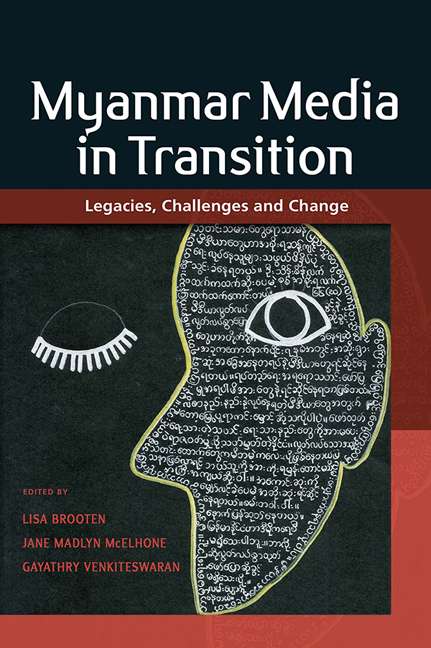Book contents
- Frontmatter
- Contents
- Contributors and Editors
- Burma or Myanmar? A Note on Terminology
- 1 Introduction: Myanmar Media Historically and the Challenges of Transition
- Part I Structural Constraints and Opportunities
- Part II Journalism in Transition
- Part III Creative Expression
- 14 Myanmar's Pop Music Industry in Transition
- 15 New Video Generation: The Myanmar Motion Picture Industry in 2017
- 16 Films for Dignity
- 17 A “Fierce” Fear: Literature and Loathing after the Junta
- Part IV Society and Media
- Epilogue: Media Studies in Myanmar – Where Do We Go from Here?
- Index
14 - Myanmar's Pop Music Industry in Transition
from Part III - Creative Expression
Published online by Cambridge University Press: 07 September 2019
- Frontmatter
- Contents
- Contributors and Editors
- Burma or Myanmar? A Note on Terminology
- 1 Introduction: Myanmar Media Historically and the Challenges of Transition
- Part I Structural Constraints and Opportunities
- Part II Journalism in Transition
- Part III Creative Expression
- 14 Myanmar's Pop Music Industry in Transition
- 15 New Video Generation: The Myanmar Motion Picture Industry in 2017
- 16 Films for Dignity
- 17 A “Fierce” Fear: Literature and Loathing after the Junta
- Part IV Society and Media
- Epilogue: Media Studies in Myanmar – Where Do We Go from Here?
- Index
Summary
In the wake of the November 2010 elections, one important signal of the Burmese government's commitment to change was the cessation of the censorship of music recordings in October 2012. Prior to that, the country's Press Scrutiny Board conducted rather rigorous censoring of so-called stereo series (albums), in cassette and later in compact disc formats. Producers wishing to sell their series in retail shops were required to submit a copy of the recording and ten copies of the song lyrics to the censors at the Press Scrutiny Board (MacLachlan 2011, p. 148). Although the censoring was supposed to be provided for free — as a government service to recording artists — producers in fact incurred regular and sometimes hefty costs in the form of “fees” and “fines” (MacLachlan 2011, p. 149). Ending the censorship requirement, then, represented the lifting of a financial burden borne by musicians and producers. Even more importantly, it was a powerful symbol of the transition government's commitment to freedom of artistic expression.
I began conducting fieldwork in Myanmar in 2007, researching the country's popular music industry. I subsequently published a book (Maclachlan 2011) that describes the norms that prevailed in the music industry during the era of military dictatorship. In one section of that book I examined how musicians and censors interacted, contesting the assertion found in other scholarly accounts that, at that time, censorship of music was total and that the military government controlled all artistic expression in Burma. In fact, musicians and censors engaged in a complex negotiation of power, and musicians exercised a considerable degree of agency in the creation and dissemination of their recordings. Nevertheless, I acknowledged that censorship was an important, although not defining, element of professional pop musicians’ lives under military rule. In retrospect, I characterize that research as an analysis of the pre-transition popular music scene. This chapter constitutes the next step in a now decadelong inquiry into the Burmese popular music industry, and describes the situation during the current transition period. My findings are based on fieldwork conducted in Yangon, the centre of the popular music industry, in May and June 2013, and in April and May 2018.
- Type
- Chapter
- Information
- Myanmar Media in TransitionLegacies, Challenges and Change, pp. 267 - 286Publisher: ISEAS–Yusof Ishak InstitutePrint publication year: 2019



